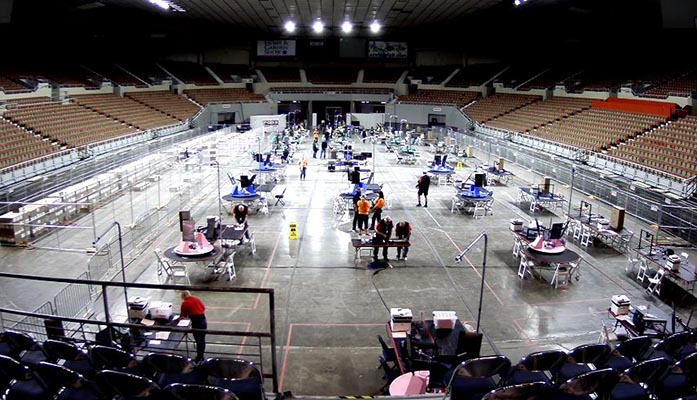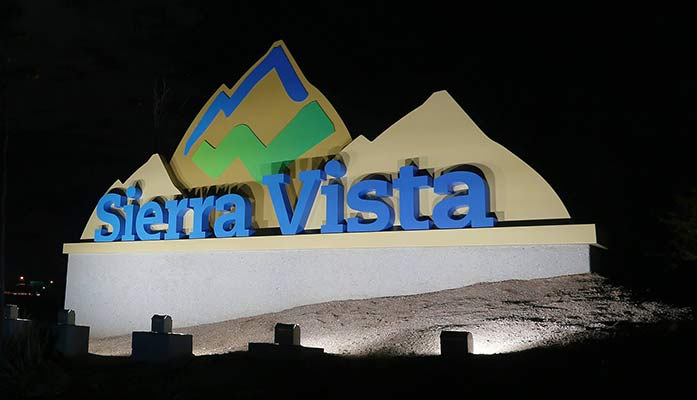
by Terri Jo Neff | Jul 29, 2021 | News
By Terri Jo Neff |
Twelve hours after announcing his plans to step down as the liaison for the Arizona Senate’s audit, Ken Bennett says he is back in the good graces of the audit team and will be provided full access so he can assist in review of any reports to the Senate.
Bennett told KFYI’s James T. Harris on Wednesday morning he had become “liaison in name only” and may not even be involved in the preparation of the final audit report into how Maricopa County handled the 2020 General Election because he was locked out of the audit premises by other team members at the directive of Senate President Karen Fann.
But by Wednesday evening, Bennett told colleagues that Fann had agreed to meet several demands to keep Bennett actively involved through the end of the audit. Details of the agreement are to be announced Thursday.
Bennett, a former Arizona Secretary of State, was chosen by Fann to act on her behalf with Cyber Ninjas, the company she contracted to conduct the audit. There have also been several subcontractors.
However, last week Fann became upset that Bennett released some unconfirmed audit data to an election expert, from whom it was released to the media. In addition to the lockout, Fann issued a statement Tuesday scolding Bennett for his actions even though he had publicly apologized several times.
Fann also noted in her statement that Bennett would continue his involvement in the audit which is now in the analysis phase leading up to preparation of final reports. Audit observers say those reports need to have Bennett’s blessing in order for the public to accept any of Cyber Ninjas’ findings.
Bennett, however, told Harris his continued involvement, particularly with any reports, was would not be feasible if he continued to be frozen out of the audit process. “I cannot put a rubber stamp on a product that I am being locked out of its development,” he said.
Fann and Bennett were reportedly finalizing the terms and conditions of Bennett’s continued participation with the audit on Wednesday night.
Meanwhile, Cyber Ninjas CEO Doug Logan announced Wednesday that more than $5.7 million was donated toward the cost of the audit. The funds came from five groups, including one co-founded by OANN reporter Christina Bobb and another connected to Sidney Powell, who served earlier this year as one of former President Donald Trump’s attorneys.
According to Logan, $3.25 million was received from Florida-based The America Project. There was also nearly $977,000 from America’s Future, a non-profit organization chaired by Lt. Gen. Michael T. Flynn, (USA Ret.), along with $605,000 from Bobb’s Voices and Votes.
Another $550,000 was received from Defending The Republic, whose board of directors include Powell, Flynn, MyPillow CEO Mike Lindell, and others who support claims that former President Donald Trump actually won the 2020 election. And $280,000 is reported as coming from the combined Legal Defense Funds for the American Republic and the Election Integrity Funds for the American Republic.
Logan’s company was contracted earlier this year by Fann contracted for a total payment of $150,000. The contract did not preclude Cyber Ninjas or any of the subcontractors from seeking or accepting private funding toward the true cost of the audit, which has involved more than 1,500 workers and volunteers

by Terri Jo Neff | Jul 28, 2021 | News
By Terri Jo Neff |
A longtime Phoenix city politico calls Monday’s arrest of nearly 40 people -including Reverend Jesse Jackson and State Sen. Martin Quezada- outside U.S. Sen. Kyrsten Sinema’s office “performance art,” as it was arranged ahead of time by protest organizers.
Sam Stone, chief of staff for Phoenix Councilman Sal DiCiccio, told KFYI’s James T. Harris on Tuesday that the protesters’ sit-in at Simena’s office on East Camelback was “an optical joke” intended to garner local and national media headlines “screaming up and down that Rev. Jackson was arrested” for not following police commands.
The truth, Stone told Harris, was that “Rev. Jackson arranged to be put in handcuffs for a few minutes for the photo.”
Stone also said police officers were forced by city officials to standby outside Sinema’s office until the protesters “were ready to leave on their own.” Only then were officers allowed to issue citations to the protestors and instruct them to disperse, he said.
“They actually went and communicated with our police department and were like ‘we going to come out there and protest and we would like you to arrest us cuz we’re going to break the law, but we don’t actually want to go to jail,’” Stone told Harris.
Those arrested were cited on suspicion of criminal trespassing, a Class 1 misdemeanor, the lowest level of criminal conduct in Arizona. Stone predicted all charges “will be thrown out before they ever see any type of court or fee or fines or anything of the sort.”
More than 200 people started the protect event by rallying at a local city park. Many of the protesters then marched several blocks to Sinema’s office, where about 40 engaged in the sit-in. Their purpose, according to protesters, was to draw attention to Sinema’s position on the filibuster, a Senate rule which requires at least 60 votes from the 100 senators to cut off debate on most non-budgetary measures in order to bring a matter to vote.
With 50 Democrats and 50 Republicans, getting partisan legislation to a vote is nearly impossible, so there is a growing push to change the filibuster rule. Sinema, a Democrat, has held firm on her belief that the rule should stay as is, at least for now.
Stone, a Republican, also used the interview to praise Sinema for “holding the line” on the filibuster.
“We have these norms for a reason to provide some balance, some moderation, so that D.C. doesn’t go completely off the rails every time you have a different party take control of the Senate,” Stone told Harris. “I applaud her for that.”
It is unknown how much Monday’s three-hour event cost taxpayers in terms of manpower. Eight city blocks of Camelback were closed at various times, leading to restricted access to businesses and residences.
And that did not set well with Stone, who noted the impact on emergency responders and residents alike. “People don’t understand the reason we have laws on not blocking streets is not to stifle protest – it’s to protect people,” he said.
Stone is the founder and managing partner of Caim Consulting, a political consulting firm with offices in Phoenix and Washington, DC. One of his clients is Arizona gubernatorial candidate Kari Lake, a former Phoenix-area news anchor.
https://www.iheart.com/podcast/960-conservative-circus-w-jame-28823469/

by Terri Jo Neff | Jul 27, 2021 | News
By Terri Jo Neff |
Healthcare workers came under more pressure Monday to receive the COVID-19 vaccination following the release of a joint statement by 58 medical organizations supporting mandated vaccines for industry workers.
Among those advocating for a “vaccine-or-termination” policy are the American Medical Association, the American College of Physicians, the American Public Health Association, and the National Pharmaceutical Association.
“This is the logical fulfillment of the ethical commitment of all health care workers to put patients as well as residents of long-term care facilities first and take all steps necessary to ensure their health and well-being,” the statement reads, citing rising COVID-19 infections and deaths compared to a few months ago.
The problem with the statement is two-fold, according to one Arizona medical administrator. First, talk of firing unvaccinated healthcare workers at a time when there is a statewide shortage of nurses, specialty providers, and support staff will harm residents long-term, she told Arizona Daily Independent.
And second, the 180 degree turn made by medical and public health officials completely ignores the fact mask mandates, social distancing, and business lockdowns were undertaken in Arizona and many other states to ensure hospitals were not overwhelmed and overrun by COVID-19 patients. That worry is not as relevant now because medical workers are better trained on COVID-related treatment options and urgent care facilities and hospitals are well stocked with the equipment needed for diagnosis and treatment.
“They aren’t telling you that we’ve learned the last year about treating COVID-19. Instead, all you hear about are scary big numbers showing this month’s positive test rate increased over last month’s positive test rate,” the administrator said.
“What no one is telling medical workers or patients is how the number of people currently testing positive or being hospitalized remains well shy of the highs we saw last summer or earlier this year. And they are completely ignoring the fact even several hospitals in high-infection states have plenty of open beds and well-trained staff,” the administrator said.
The subject of required vaccinations for Arizona’s medical professionals was fueled last week when Banner Health and HonorHealth announced that employees could lose their jobs unless they refuse to provide proof of vaccination. Banner Health is Arizona’s largest private employer.
Both companies are giving their staff and volunteers until Nov. 1 to comply, raising questions are to whether the edict is motivated by concern to protect patients and co-workers or if there is a possible financial motivation. Last week a longtime Banner nurse told Arizona Daily Independent she questioned why something the company claims is urgently needed is not being required for another 90 days.
However, the immediate past president of the American Medical Association apparently is not concerned with whether current infection rates are manageable or not. She said Monday that forcing medical professional and others in the healthcare industry to be vaccinated is for the workers’ own good.
“It is critical that all people in the health care workforce get vaccinated against COVID-19 for the safety of our patients and our colleagues,” Dr. Susan R. Bailey said in a statement released by the AMA. “Increased vaccinations among health care personnel will not only reduce the spread of COVID-19 but also reduce the harmful toll this virus is taking within the health care workforce and those we are striving to serve.”
The AMA’s website also acknowledges “the historical mistrust of health care institutions, including among many in our own health care workforce. We must continue to address workers’ concerns, engage with marginalized populations, and work with trusted messengers to improve vaccine acceptance.”
Slightly less than one-half of adults in America have been fully vaccinated, although the percent by state widely varies. Arizona ranks below midway at 45 percent, while Vermont tops the charts at a 67 percent adult vaccination rate, followed closely by Massachusetts, Maine, and Connecticut.
On the far low end are Alabama, Mississippi, and the U.S. Virgin Islands which report less than 35 percent of their adult population vaccinated.


by Terri Jo Neff | Jul 26, 2021 | News
By Terri Jo Neff |
It is an example of typical government-speak: “The Office of Management and Budget today announced the 2020 Standards for Delineating Core Based Statistical Areas.”
But the OMB’s July 13 announcement was something several Arizona cities were anxiously awaiting, because the 2020 Standards could have disqualified them from qualify as a Metropolitan Statistical Area (MSA). And that would have meant losing their advantage over other towns and cities when applying for federal funding for healthcare, housing, infrastructure, and transportation projects.
Since 2010, at least 50,000 residents must live in the core city to obtain federal recognition a Metropolitan Statistical Area (MSA), even if it is more of a mini-metro area. In Arizona, there are seven designated MSAs: Flagstaff, Lake Havasu City-Kingman, Phoenix-Mesa-Chandler, Prescott, Sierra Vista-Douglas, Tucson, and Yuma.
However, every 10 years the OMB recommends changes to its standards, and earlier this year a federal interagency committee suggested a major change for the 2020 Standards – doubling a MSA’s minimum core city population to 100,000. That would have resulted in Flagstaff, Lake Havasu City-Kingman, Prescott, and Sierra Vista-Douglas losing their MSA status.
And along with the loss of the MSA designation would have been one of those cities’ key qualifier for federally funded Community Development Block Grants and USDA Rural Development Grants. Flagstaff receives nearly $600,000 a year just in CDB grants, while Prescott and Sierra Vista have been the recipients of more than $200,000 in annual CDB grants.
The Metropolitan and Micropolitan Statistical Area Standards Review Committee received letters of opposition from the cities of Flagstaff and Prescott among more than 700 other public comments about the significant change in MSA criteria. In the end, the committee submitted a revised recommendation to stick with the 50,000 population threshold.
Mignonne Hollis says the MSA designation ensures communities like Flagstaff and Sierra Vista-Douglas can advocate for their needs by giving them a seat “at many tables.”
Hollis serves as executive director of the Sierra Vista-based Arizona Regional Economic Development Foundation and of the Aerospace Arizona Association, is past president of the Arizona Association for Economic Development, and is a member of the International Association for Economic Development.
She was one of the first in Cochise County to sound the alarm on the devastating affect a 100,000 core population prerequisite would have had on the Sierra Vista – Douglas.
“This funding is vital to bring investment in our local communities and spur on economic development,” Hollis said of the opportunities available to a MSA. “In addition to funding decisions at the federal level, the loss of a MSA designation could also negatively impact a community’s ability to attract and retain businesses and top-talent employees.”
While good news for Arizona communities this year, the OMB’s July 13 announcement provided a heads-up that a MSA threshold change will likely be incorporated in 2030.
“Recognizing the committee’s concern that MSA thresholds have not kept pace with population growth, OMB will work with the Standards Review Committee to conduct research and stakeholder outreach to inform the 2030 standards update,” the announcement said.
There has also been bi-partisan federal legislation introduced by Arizona Sen. Mark Kelly, a Democrat, and South Dakota Sen. John Thune, a Republican, to look into how MSA core city population thresholds are determined in the future.

by Terri Jo Neff | Jul 25, 2021 | News
By Terri Jo Neff |
The announcement last week by officials of Ben & Jerry’s that the ice cream company would stop selling its products in the Israeli-controlled West Bank at the end of 2022 prompted Gov. Doug Ducey to call the move “discrimination.”
Ducey added that “Arizona stands with Israel” and said the state “will not do business with a company that boycotts Israel.” He also reminded Arizonans that as governor has twice signed legislation in an attempt to make sure the State does not contract with entities engaging in boycotts of Israel. It is unclear how much money was spent annually by state agencies on Ben & Jerry’s products before and after the legislation.
The decision by Unilever-owned Ben & Jerry’s came after pro-Palestinian activists worked to garner support within the United States for Boycott, Divestment, Sanctions (BDS) efforts involving companies which do business in Israeli or in West Bank communities which Palestinians claim a right to.
The Anti-Defamation League calls BDS efforts anti-Semitic, anti-Israel, and bigoted.
Ben & Jerry’s has not announced any plans to step selling its products in any other areas of Israel, although a factory in southern Israel is reportedly slated for closure despite not being near occupied or disputed territory.
Both Israeli Prime Minister Naftali Bennett and Foreign Minister Yair Lapid criticized the decision by Ben & Jerry’s. And in New York, the board of directors of a grocery chain recently voted to cut off all promotional activities involving Ben & Jerry’s products.
Avi Kaner, co-owner of Morton Williams Supermarkets, said the objective of “extremists” within Ben & Jerry’s “is very, very selective boycotts specifically against the Jewish people,” particularly those who live in Jewish communities within disputed territories.
“Who is Ben & Jerry’s to say that little Jewish girls cannot have ice cream in the Jewish quarter of Jerusalem?” Kaner said.
Earlier this year several students at Arizona State University (ASU) sought to pass a resolution in support of BDS efforts. The president of the ASU Undergraduate Student Government declined to put the matter on a meeting agenda.






